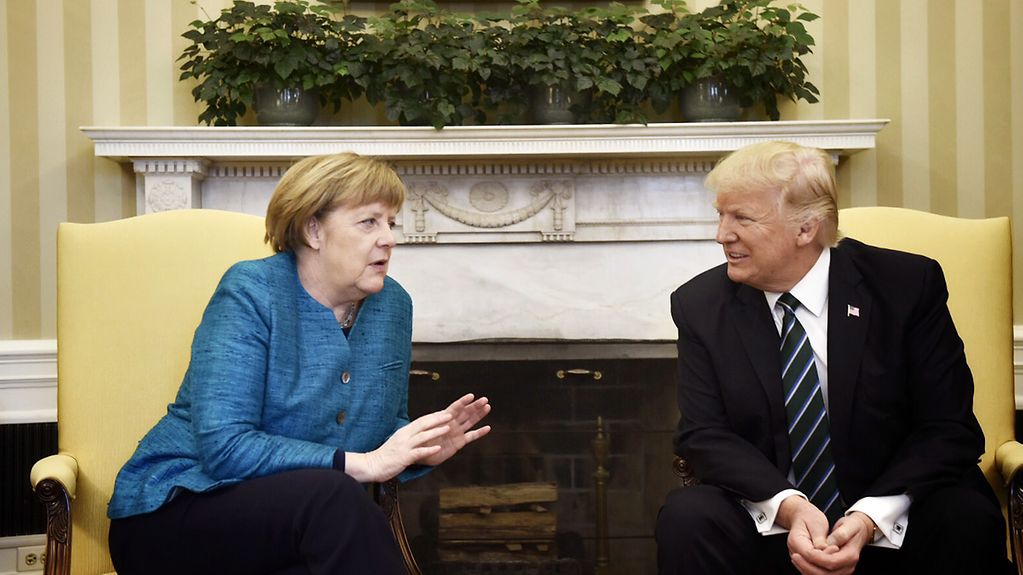Chancellor meets with President Donald Trump
Speaking at the joint press conference in the White House, Chancellor said it had been a great pleasure for her to meet the President in person for the first time. The main aim, she said was to speak to one another rather than about one another, and to identify common interests.

In the Oval Office: the first meeting of Chancellor Angela Merkel and President Donald Trump
Photo: Bundesregierung/Kugler
Chancellor Angela Merkel has met President Donald Trump for the first time. After their meeting, the Chancellor summed up, "We have had a good, frank first exchange of views". She added that she looked forward to more discussions. On a number of issues the two sides intend to "work together intensively at the level of our advisors".
The Chancellor’s visit to President Donald Trump was the first time the two leaders had met face to face. The meeting, originally planned for Tuesday 14 March, was postponed because a severe storm was forecast for the East Coast of the USA. The decision to delay the visit was made only a few hours before the Chancellor’s plane took off on Monday evening.
Shared security interests
The Chancellor thanked the USA for decades of support. After the Second World War, the Marshall Plan made economic recovery "possible in a very special way". During the Cold War too, the United States were always there at our side. And the reunification of Germany, divided since the Second World War, would have been inconceivable without the support of the USA. "We are happy that today we can live in freedom and security in a reunited country," said Angela Merkel.
The Chancellor thanked the President for his clear commitment to NATO. "NATO is extremely important for us, and it is no accident that, at the NATO summit in Wales, it was noted that Germany too will increase its defence spending," reiterated Angela Merkel. In Wales in 2014, German affirmed its commitment to achieving the two-per cent target by 2024. It increased its defence budget by eight per cent last year alone.
The issue of security and defence "does of course have many facets" over and above NATO, including development assistance and the question of support for missions in Africa, where African soldiers are fighting to guarantee freedom and security. "Talks will continue on these points," said Angela Merkel. With a view to Afghanistan, she reported that the two sides had agreed that Germany would continue its commitment there, as would the USA. "We will work hand in hand in Afghanistan." The American President concurred on this point.
Fighting terrorism – and working for peace
With a view to efforts to fight international terrorism, the Chancellor said, "We are fighting Islamist terrorism together." Germany will continue both training activities in Iraq and reconnaissance in terms of Syria. The two sides are to work together to achieve political solutions in Syria and in Libya.
"I am happy that the American administration and the President personally have affirmed their commitment to the Minsk process," stressed Angela Merkel. A solution must be found, because it is on the one hand a question of achieving a secure and sovereign Ukraine, "but also of the chance to improve relations with Russia – once the problems in Ukraine are resolved." The Minsk agreements provide "a basis for this, but regrettably not much progress has yet been made." That is why there is to be very close cooperation at expert level over the coming months, in order to achieve progress.
Harnessing economic potential
"I am also here in my capacity as President of the G20," said Angela Merkel. "This year we will be hosting the G20 summit and I am happy that the President has already accepted our invitation to attend the summit in Hamburg." The two sides will stay in touch with respect to the July summit.
"We all advocate a fair trading system. We need a win-win situation where all sides benefit," she stressed. The two sides will continue to discuss details. During their meeting with industrialists and trainees it was already apparent "what potential our two economies have". It was very moving to see how much work is being done here for the future, she said. Particularly in terms of the transition from classic industrial production to the digitalisation of manufacturing, "Industry 4.0" as it is known in Germany, skills, training and capabilities are vitally important - "not only for young people, but also for those who might have become unemployed and need training to get back into work" stressed Angela Merkel. This issue is crucially important in both countries, she said.
Fair trade between the EU and the USA
Angela Merkel stressed that she represents German interests in her capacity as Chancellor of the Federal Republic of Germany. That makes it important, she said, to discuss divergent interests in an atmosphere of friendship with the USA. The aim must be to "identify solutions, compromises that are acceptable to both sides. It must be fair." After all, everyone expects their head of government "to bring back something for the people at home".
Commenting on President Trump’s comments about unequal terms of trade the Chancellor said, "Germany’s success in economic terms, but also in the field of security and peace, is always a success story where the one side of the coin is Germany’s success and the other is the success of European unity."
In this context she said, she would welcome a resumption of negotiations on the Transatlantic Trade and Investment Partnership (TTIP). "I see it as a bilateral agreement between the European Union and the United States of America." Germany has transferred the authority to negotiate to the European Union.
In the final analysis, she pointed out, globalisation must be open, but naturally also fair. Freedom of movement is an essential element in achieving this. Illegal migration must be ended, but people who want to flee must be given better prospects in their own countries.











